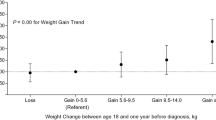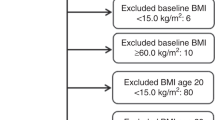Abstract
Purpose
This study aimed to investigate the association between long-term excess body fat and breast cancer risk by studying adult weight gain together with the subsequent weight fluctuations.
Methods
Weight gain measure in three different time periods in adulthood of 1500 participants was collected in a case–control study of Western China. Logistic regression models were used to estimate odds ratios and 95% CIs.
Results
The increased risk of postmenopausal BC was associated with adult weight gain at 5 years and at 10 years before enrollment (OR 1.24, 95% CI 1.03–1.49 per 5 kg increase; OR 1.40, 95% CI 1.14–1.70 per 5 kg increase) but was not associated with adult weight gain at enrollment (OR 0.97, 95% CI 0.81–1.16 per 5 kg increase). Only a positive association was observed in premenopausal women who had gained > 5.0 kg at 10 years before enrollment (OR 1.61, 95% CI 1.10–2.35). Women who had gained > 5.0 kg at 10 years before enrollment and continued to gain during the subsequent 5 years had the highest postmenopausal BC risk (OR 3.34, 95% CI 1.58–7.08).
Conclusion
Adult weight gain at 5 years and 10 years before enrollment are more closely associated with postmenopausal BC risk than adult weight gain at enrollment in Western China. Controlling body weight as early as possible throughout adulthood to keep weight gain not more than 5.0 kg is particularly necessary for Chinese women.


Similar content being viewed by others
References
Sung H, Siegel RL, Torre LA et al (2018) Global patterns in excess body weight and the associated cancer burden. Cancer J Clin. https://doi.org/10.3322/caac.21499
Lauby-Secretan B, Scoccianti C, Loomis D et al (2016) Body fatness and cancer-viewpoint of the IARC working group. N Engl J Med 375(8):794–798. https://doi.org/10.1056/NEJMsr1606602
Colditz GA, Peterson LL (2018) Obesity and cancer: evidence, impact, and future directions. Clin Chem 64(1):154–162. https://doi.org/10.1373/clinchem.2017.277376
Islami F, Goding Sauer A, Miller KD et al (2018) Proportion and number of cancer cases and deaths attributable to potentially modifiable risk factors in the United States. CA Cancer J Clin 68(1):31–54. https://doi.org/10.3322/caac.21440
World Cancer Research Fund/American Institute for Cancer Research (2018) Continuous Update Project Expert Report 2018. Recommendations and public health and policy implications. Accessed 11 April 2020
World Cancer Research Fund/American Institute for Cancer Research (2018) Continuous Update Project Expert Report 2018. Body fatness and weight gain and the risk of cancer. Accessed 11 April 2020
Keum N, Greenwood DC, Lee DH et al (2015) Adult weight gain and adiposity-related cancers: a dose-response meta-analysis of prospective observational studies. J Natl Cancer Inst. https://doi.org/10.1093/jnci/dju428
Ballard-Barbash R, Schatzkin A, Taylor PR et al (1990) Association of change in body mass with breast cancer. Cancer Res 50(7):2152–2155
Ballard-Barbash R (1994) Anthropometry and breast cancer. Body size: a moving target. Cancer 74(3 Suppl):1090–1100
Enriori CL, Orsini W, Del CCM et al (1986) Decrease of circulating level of SHBG in postmenopausal obese women as a risk factor in breast cancer: reversible effect of weight loss. Gynecol Oncol 23(1):77–86
Hu FB (2008) Obesity epidemiology. Oxford University Press, New York
Li HL, Gao YT, Li Q et al (2006) Anthropometry and female breast cancer: a prospective cohort study in urban Shanghai. Zhong hua liu xing bing xue za zhi 27(6):488–493
White KK, Park SY, Kolonel LN et al (2012) Body size and breast cancer risk: the multiethnic cohort. Int J Cancer 131(5):E705–716. https://doi.org/10.1002/ijc.27373
Ahn J, Schatzkin A, Lacey JV Jr et al (2007) Adiposity, adult weight change, and postmenopausal breast cancer risk. Arch Intern Med 167(19):2091–2102. https://doi.org/10.1001/archinte.167.19.2091
Lahmann PH, Schulz M, Hoffmann K et al (2005) Long-term weight change and breast cancer risk: the European prospective investigation into cancer and nutrition (EPIC). Br J Cancer 93(5):582–589. https://doi.org/10.1038/sj.bjc.6602763
Rosner B, Eliassen AH, Toriola AT et al (2017) Weight and weight changes in early adulthood and later breast cancer risk. Int J Cancer 140(9):2003–2014. https://doi.org/10.1002/ijc.30627
Moy FM, Greenwood DC, Cade JE (2018) Associations of clothing size, adiposity and weight change with risk of postmenopausal breast cancer in the UK Women's Cohort Study (UKWCS). BMJ Open 8(9):e022599. https://doi.org/10.1136/bmjopen-2018-022599
Cao S, Zhou J, Zhu Z et al (2019) Adult weight change and the risk of pre- and postmenopausal breast cancer in the Chinese Wuxi Exposure and Breast Cancer Study. Breast Cancer Res Treat 173(3):647–655. https://doi.org/10.1007/s10549-018-5016-3
Michels KB, Terry KL, Eliassen AH et al (2012) Adult weight change and incidence of premenopausal breast cancer. Int J Cancer 130(4):902–909. https://doi.org/10.1002/ijc.26069
Kawai M, Minami Y, Kuriyama S et al (2010) Adiposity, adult weight change and breast cancer risk in postmenopausal Japanese women: the Miyagi Cohort Study. Br J Cancer 103(9):1443–1447. https://doi.org/10.1038/sj.bjc.6605885
Krishnan K, Bassett JK, MacInnis RJ et al (2013) Associations between weight in early adulthood, change in weight, and breast cancer risk in postmenopausal women. Cancer Epidemiol Biomarkers Prev 22(8):1409–1416. https://doi.org/10.1158/1055-9965.EPI-13-0136
Palmer JR, Adams-Campbell LL, Boggs DA et al (2007) A prospective study of body size and breast cancer in black women. Cancer Epidemiol Biomarkers Prev 16(9):1795–1802. https://doi.org/10.1158/1055-9965.EPI-07-0336
Komaroff M (2016) Weight fluctuation and postmenopausal breast cancer in the national health and nutrition examination survey I epidemiologic follow-up study. J Obes 2016:7168734. https://doi.org/10.1155/2016/7168734
Eng SM, Gammon MD, Terry MB et al (2005) Body size changes in relation to postmenopausal breast cancer among women on Long Island. New York Am J Epidemiol 162(3):229–237. https://doi.org/10.1093/aje/kwi195
Canchola AJ, Anton-Culver H, Bernstein L et al (2012) Body size and the risk of postmenopausal breast cancer subtypes in the California Teachers Study cohort. Cancer Causes Control. https://doi.org/10.1007/s10552-012-9897-x
Liu Y, Warren Andersen S, Wen W et al (2016) Prospective cohort study of general and central obesity, weight change trajectory and risk of major cancers among Chinese women. Int J Cancer 139(7):1461–1470. https://doi.org/10.1002/ijc.30187
Yager JD, Davidson NE (2006) Estrogen carcinogenesis in breast cancer. N Engl J Med 354(3):270–282. https://doi.org/10.1056/NEJMra050776
Bandera EV, Fay SH, Giovannucci E et al (2016) The use and interpretation of anthropometric measures in cancer epidemiology: a perspective from the world cancer research fund international continuous update project. Int J Cancer 139(11):2391–2397. https://doi.org/10.1002/ijc.30248
Playdon MC, Bracken MB, Sanft TB et al (2015) Weight gain after breast cancer diagnosis and all-cause mortality: systematic review and meta-analysis. J Natl Cancer Inst 107(12):275. https://doi.org/10.1093/jnci/djv275
World Cancer Research Fund/American Institute for Cancer Research (2017) Systematic literature review continuous update report. The Associations between Food, Nutrition and Physical Activity and the Risk of Breast Cancer. Accessed 11 April 2020
Rinaldi S, Key TJ, Peeters PHM et al (2006) Anthropometric measures, endogenous sex steroids and breast cancer risk in postmenopausal women: a study within the EPIC cohort. Int J Cancer 118(11):2832–2839. https://doi.org/10.1002/ijc.21730
Samavat H, Kurzer MS (2015) Estrogen metabolism and breast cancer. Cancer Lett 356(2):231–243. https://doi.org/10.1016/j.canlet.2014.04.018
Chen W, Zheng R, Baade PD et al (2015) (2016) Cancer statistics in China. CA Cancer J Clin 66(2):115–132. https://doi.org/10.3322/caac.21338
World Health Organization (2016) Global Nutrition Monitoring Framework. https://apps.who.int/nutrition/landscape/report.aspx?iso=CHN&rid=1621&goButton=Go. Accessed 25 April 2020
Wang Q, Li J, Zheng S et al (2012) Breast cancer stage at diagnosis and area-based socioeconomic status: a multicenter 10-year retrospective clinical epidemiological study in China. BMC Cancer 12(1):122. https://doi.org/10.1186/1471-2407-12-122
Leatherdale ST, Laxer RE (2013) Reliability and validity of the weight status and dietary intake measures in the COMPASS questionnaire: are the self-reported measures of body mass index (BMI) and Canada's food guide servings robust? Int J Behav Nutr Phys Acta 10:42. https://doi.org/10.1186/1479-5868-10-42
Casey VA, Dwyer JT, Berkey CS et al (1991) Long-term memory of body weight and past weight satisfaction: a longitudinal follow-up study. Am J Clin Nutr 53(6):1493–1498. https://doi.org/10.1093/ajcn/53.6.1493
McCullough LE, Eng SM, Bradshaw PT et al (2012) Fat or fit: the joint effects of physical activity, weight gain, and body size on breast cancer risk. Cancer 118(19):4860–4868. https://doi.org/10.1002/cncr.27433
Acknowledgements
We thank Mark Abramovitz, PhD, and H. Nikki March, PhD, for editing this paper. And we also thank all the participants from the Sichuan Cancer Hospital, Sichuan Provincial People's Hospital, West China Hospital of Sichuan University, and Chengdu Shuangliu District Maternal and Child Health Hospital.
Funding
This study was funded by the grants from the National Natural Science Foundation of China (No. 81302500) and was also supported by the People-benefit Project of Chengdu Science and Technology Bureau (No. 2015-HM01-00049-SF) and Key R & D project of science and technology program of Sichuan, China (No. 2017SZ0005).
Author information
Authors and Affiliations
Corresponding author
Ethics declarations
Conflict of interest
The authors declare that they have no conflicts of interest.
Ethical approval
All procedures performed in studies involving human participants were in accordance with the ethical standards of the institutional and/or national research committee and with the 1964 Helsinki declaration and its later amendments or comparable ethical standards.
Informed consent
Informed consent was obtained from all individual participants included in the study.
Additional information
Publisher's Note
Springer Nature remains neutral with regard to jurisdictional claims in published maps and institutional affiliations.
Electronic supplementary material
Below is the link to the electronic supplementary material.
Rights and permissions
About this article
Cite this article
Hao, Y., Xu, B., Yan, Q. et al. Long-term excess body fat in adulthood and the risk of pre- and postmenopausal breast cancer in Chinese women. Breast Cancer Res Treat 182, 195–206 (2020). https://doi.org/10.1007/s10549-020-05685-4
Received:
Accepted:
Published:
Issue Date:
DOI: https://doi.org/10.1007/s10549-020-05685-4




